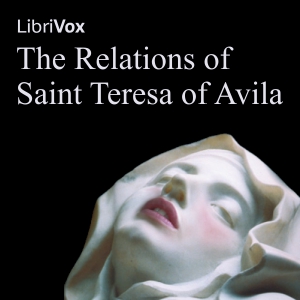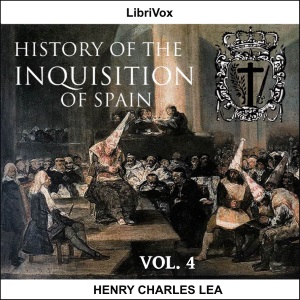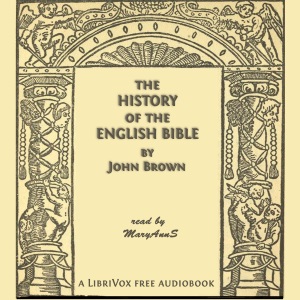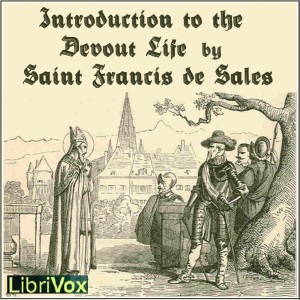LibriVox volunteers bring you this year's selection of 23 sacred and secular carols, hymns and Christmas songs, in English, French, German, Japanese and Latin.
23 episodes
Towards the close of his ministry on earth, Jesus taught his disciples of the need for them to abide in Him. This word "abide" speaks of the intimacy of fellowship with the Master to which his followers are still invited. Andrew Murray wrote this series of meditations, which he subtitled "Thoughts on the Blessed Life of Fellowship with the Son of God", out of a conviction that many believers are missing out on something that is really at the heart of a healthy Christian life. The author explains that many, although they trust the Lord for forgiveness and help, have yet to experience the blessing of a day by day and hour by hour walk with the Lord, and therefore are not enjoying the power, the joy and the fruitfulness that is available to each one. He shows how, by taking the time to live closer to Jesus, we may move into a deeper and stronger Christian experience. (Summary by Christopher Smith)
32 episodes
... or How Shall Man Be Just with God?How does salvation work? How does a righteous God declare an unrighteous person to be righteous in His sight? In this comprehensive and devotional study of justification by faith alone in the Person and work of the Lord Jesus Christ, Horatius Bonar answers these questions in a clear and wonderful way. Bonar has been called the prince of Scottish hymn writers. Quoting one of the 600 hymns he wrote, here is "righteous peace securely made" (Summary by Jay Reader)
Additional proof-listening by Kimberly Krause.
11 episodes
Those who have an experiential predisposition in their faith would do well to read The Conversations and Letters of Brother Lawrence… if they have not done so already. This is a lesser-known work, often overlooked. These Spiritual Maxims were manuscripts found amongst the aforementioned Letters and also written by Brother Lawrence himself. The Maxims are different from the letters — the careful arrangement adopted suggests matured thought and the inference is not unreasonable that he intended them to sum up his teachings.The reader apologises for the unworthiness of his delivery… the English itself was difficult enough to read and the ancient punctuation had more commas than full stops. My sometimes stilted delivery is caused by me being partially-sighted and having to read everything in short sections. (Introduction by the reader)
6 episodes

This year's LibriVox selection of traditional Christmas carols, hymns and songs in English, French, German, Greek, Italian and Ukrainian. We wish you all a happy and peaceful Christmas.
English:
All Children are on Christmas Eve - Words & Music: Rev. Charles L. Hutchins (1838-1920).
Angels from the Realms of Glory - Words: James Montgomery (1771-1854); Music: Henry T. Smart (1813-1879).
Angels We Have Heard on High - Words: French Carol, trans. James Chadwick (1813-1882). Music: 'Gloria' French carol melody.
The Babe of Bethlehem - Old Kentish carol, arr. Henry R. Bramley (1833-1917) & John Stainer (1840-1901).
The First Nowell - traditional English carol, first published in its current form in Carols Ancient and Modern (1823) edited by William Sandys.
Good King Wenceslas - Words: John Mason Neale (1818-1866). Music: from Piae Cantiones (1582) arr. Henry R. Bramley (1833-1917) & John Stainer (1840-1901).
Hark! The Herald Angels Sing - Words: Charles Wesley (1707-1788) Music: Felix Mendelssohn (1809-1847), arr. William H. Cummings (1831-1915).
The Holly and the Ivy - Words: Traditional. Music: Traditional, arr. Henry R. Bramley (1833-1917) & John Stainer (1840-1901).
I Heard the Bells on Christmas Day - Words: Henry Wadsworth Longfellow (1807-1882) Music: John B. Calkin (1827-1905).
In Little Bethlehem - Words: Katherine Parker; Music: George W. Wilmot. In Beginner and Primary Songs for use in Sunday School and the Home.
In the Bleak Midwinter - Words: Christina Rossetti (1830 - 1894); Music: Gustav Holst (1874 - 1934).
Joy to the World - Words: Words: Isaac Watts (1674 - 1748); Music: 'Antioch' pieced together from 'Messiah' by George F. Handel (1685 - 1759) arr. Lowell Mason (1792-1872).
Lo, How a Rose E'er Blooming - Words: Words: v. 1-2, 15th Century German, trans. Theodore Baker ( 1851–1934); v. 3,4 Fridrich Layriz (1808-1859), trans. Harriet Reynolds Krauth (1845-1925); v. 5, 15th Century German, trans. John C. Mattes(1876-1948). Music: 'Es Ist Ein Ros Entsprungen (Rhythmic)' German from Köln, 1599, arr. Michael Praetorius (1571-1621).
Masters in this Hall, or, Nowell, Sing We Clear - Words: William Morris (1834-1896); Music: French Traditional.
O Come, O Come, Emmanuel - Words: translated from the Latin by John Mason Neale (1818-1866). Music: 'Veni Emmanuel', 15th Century.
Rise Up, Shepherd an' Foller - Words & Music: American Traditional arr. Franklin Robinson.
Sweet Was the Song the Virgin Sung - From William Ballet's Lute Book c.1600. Music: arr. Dr. Charles Wood (1866–1926).
Wassail! Wassail All Over the Town! (Gloucestershire Wassail) - Words & Music: English Traditional.
We Three Kings of Orient Are - Words & Music: Rev. John Henry Hopkins, Jr. D.D. (1821-1891).
What Child is This? - Words: William Chatterton Dix (1837-1898). Music: English Traditional.
français (French):.
Dans cette étable - Words: French Traditional; Music: Charles Gounod (1818-1893).
Deutsch (German):.
Es kommt ein Schiff geladen - Words: Daniel Sudermann (1550 - 1631?); Music: first published in Andernacher Gesangbuch 1608.
ελληνικά (Greek):.
I Parthenos Simeron (Η Παρθένος Σήμερον) or Today the Virgin - Words and music: St. Romanos the Melodist (5th Century).
italiano (Italian):.
Canzone di Natale - Music: Arranged by Alberto Bimboni.
українська мова (Ukrainian):.
Коляда (Kolyada) - Words and music: Traditional Ukrainian..
Про різдво Христове... (Prorizdvo Khrystove) - Words and music: Traditional Ukrainian.
26 episodes
"The present work has as its basis the series of five Short Histories by the same author, which appeared in the following order: The Reformation, 1884; The Early Church, 1886; The Medieval Church, 1887; The Modern Church in Europe, 1888; and The Church in the United States, 1890. The five volumes form a connected History of the Church nearly down to the present time." (from the preface) John Fletcher Hurst was an American bishop in the Methodist Episcopal Church. He wrote the 5 histories as Chautauqua textbooks. The audio files are in the following order:Part 1: The Early Church (A.D. 30-750)Part 2: The Medieval Church (A.D. 750-1517)Part 3: The Reformation (A.D. 1517-1545)Part 4: The Modern Church in Europe (A.D. 1558-1892)Part 5: The Church in the United States (A.D. 1492-1892)
182 episodes
This is the first volume of four which goes into the details of Characters from John Bunyan's books. This one is about characters of Pilgrims Progress. - Summary by fiddlesticks
26 episodes
In introducing this book, which Andrew Murray sub-titled “Thoughts on the Calling of God’s Children to Be Holy as He is Holy”, I can do no better than to quote from the author’s own Preface: “It has been my earnest desire that I might be a helper of the faith of my brethren in seeking to trace with them the wondrous revelation of God’s Holiness through the ages as recorded in His blessed Word. It has been my continual prayer that God might use what is written to increase in His children the conviction that we must be holy, the knowledge of how we are to be holy, the joy that we may be holy, the faith that we can be holy. And may He stir us all to cry day and night to Him for a visitation of the Spirit and the Power of Holiness upon all His people, that the name of Christian and of saint may be synonymous, and every believer be a vessel made holy and meet for the Master’s use.” - Summary by Christopher Smith, quoting Andrew Murray
32 episodes
"The worst sin is prayerlessness," states P.T. Forsyth at the start of this work on prayer but follows this up with the suggestion that the study of prayer is itself a prayer to pray better. He then brings together his dual roles as theologian and pastor to unpick the nature and the practice of praying, sometimes challenging, sometimes affirming but always thoughtfully and insightfully. (Summary by Paul Mazumdar)
8 episodes
The Relations (in Spanish Relaciones) is an extention of St Teresa's Autobiography. In The Relations she tells of her inner and outer experiences in the form of letters. - Summary by Ann Boulais
11 episodes
Andrew Murray sub-titled this book "A Plea for More Prayer". In it, he shows how throughout Scripture, in the life of every saint, and that of God’s own Son, and all through Church history, God is, first of all, a prayer-hearing God. He builds upon the truths brought out in his earlier volume “With Christ in the School of Prayer”, by showing firstly that Christ meant prayer to be the great power by which His Church should do its work, and secondly that we have far too little conception of the place that intercession, as opposed to praying just for our own needs, should have in the Church and in the Christian life. The book concludes with some very helpful practical guidelines on intercession. - Summary by Christopher Smith
18 episodes
In this book, Tolstoy seeks to condense the four Gospels of the New Testament, Matthew, Mark, Luke and John, into one, by looking along the lines of the teachings of Jesus Christ found in each book. In doing so, he discovers that the Lord's Prayer is the best summation of all that Christ taught in the Gospels. - Summary by KHand
19 episodes

Brother Lawrence was born Nicholas Herman around 1610 in Herimenil, Lorraine, a Duchy of France. His birth records were destroyed in a fire at his parish church during the Thirty Years War, a war in which he fought as a young soldier. It was also the war in which he sustained a near fatal injury to his sciatic nerve. The injury left him quite crippled and in chronic pain for the rest of his life.
The details of his early life are few and sketchy. However, we know he was educated both at home and by his parish priest whose first name was Lawrence and who was greatly admired by the young Nicolas. He was well read and, from an early age, drawn to a spiritual life of faith and love for God.
We also know that in the years between the abrupt end of his duties as a soldier and his entry into monastic life, he spent a period of time in the wilderness living like one of the early desert fathers. Also, prior to entering the monastery, and perhaps as preparation, he spent time as a civil servant. In his characteristic, self deprecating way, he mentions that he was a "footman who was clumsy and broke everything".
At mid-life he entered a newly established monastery in Paris where he became the cook for the community which grew to over one hundred members. After fifteen years, his duties were shifted to the sandal repair shop but, even then, he often returned to the busy kitchen to help out.
In times as troubled as today, Brother Lawrence, discovered, then followed, a pure and uncomplicated way to walk continually in God's presence. For some forty years, he lived and walked with Our Father at his side. Yet, through his own words, we learn that Brother Lawrence's first ten years were full of severe trials and challenges.
A gentle man of joyful spirit, Brother Lawrence shunned attention and the limelight, knowing that outside distraction "spoils all". It was not until after his death that a few of his letters were collected. Joseph de Beaufort, representative and counsel to the local archbishop, first published the letters in a small pamphlet. The following year, in a second publication which he titled, 'The Practice of the Presence of God', de Beaufort included, as introductory material, the content of four conversations he had with Brother Lawrence.
In this small book, through letters and conversations, Brother Lawrence simply and beautifully explains how to continually walk with God - not from the head but from the heart. Brother Lawrence left the gift of a way of life available to anyone who seeks to know God's peace and presence; that anyone, regardless of age or circumstance, can practice -anywhere, anytime. Brother Lawrence also left the gift of a direct approach to living in God's presence that is as practical today as it was three hundred years ago.
Brother Lawrence died in 1691, having practiced God's presence for over forty years. His quiet death was much like his monastic life where each day and each hour was a new beginning and a fresh commitment to love God with all his heart. (preface and wikipedia)
2 episodes
Is it possible to be familiar with Jesus, to know the Bible, to be involved in church life, and yet not really know Jesus at all well? Andrew Murray, with his perceptive insights into the church of his day, and indeed of ours too, shows how this is all too often the condition of many believers. In the two essays comprising this book, Murray shows how we can move to a new place in really knowing Jesus, and how the presence of the Lord can become much more real to us. There is a cost, but God always abundantly rewards those who seek Him with their whole heart. - Summary by Christopher Smith
2 episodes
The Pilgrim's Progress from This World to That Which Is to Come is a Christian allegory written by John Bunyan and originally published in February, 1678. It is regarded as one of the most significant works of religious English literature, has been translated into more than 200 languages, and has never been out of print. (Summary from Wikipedia)This 1890 edition published by the American Tract Society includes a memoir of the author condensed from his "Grace Abounding," and "Life of Bunyan" by Canon Edmunds Venables.
26 episodes

In sending forth a new collection of Hymns, I feel it necessary to preface the work by a few words of explanation. The volume now in the reader's hands does not profess to be a complete collection of all the best English hymns. The comfort of invalids and the edification of Christians in private have been the two principal objects I have had in view in preparing this collection. I hold strongly, that holy thoughts often abide for ever in men's memories under the form of poetry, which pass away and are forgotten under the form of prose. The subjects of the hymns in this collection are of wide range. I have specially endeavored to include those which come home to the hearts of all true Christians, of every name, and people, and tongue. Hymns full of Jesus Christ, whether living, dying, rising, interceding, sympathizing, or coming again, -- hymns full of the experience of believers, their conflicts, crosses, hopes, fears, sorrows, and joys, -- such hymns are always useful. Of such, the Church can never have too many. Of such, I venture to think the present volume contains a rich store. (From the Preface)
31 episodes
The Ascent of Mount Carmel is one of the timeless classics of Christian contemplation, radical in its time and deeply influential in the world today. St John of the Cross and St Teresa of Avila worked together to reform the Carmelite Order in the Roman Catholic Church, in which he is honored as one of the Doctors of the Church. An active priest and teacher in his lifetime, this work is considered primary source material the training of Spiritual Directors, and an essential set of guidelines for all students of Revelation through Divine Love. ( Ed Humpal)
93 episodes
Jasher (The Sefer haYashar (first edition 1552) The Hebrew title may be translated Sefer haYashar - "Book of the Upright" - but it is known in English translation mostly as The Book of Jasher following English tradition. The book is named after the Book of Jasher referenced In Joshua 10:13; 2 Samuel 1:18; And 2 Timothy 3:8.Jasher is an historical text that covers the time period from Creation through Israel's journey into Canaan. - Summary by CJ Plog.
96 episodes
“The present volume is an excursus into individual psychology, and represents only one of several aspects of the psychology... “It is a purely empirical study into the Line of Growth in Religion in individuals, and an inquiry into the causes and conditions which determine it...” From the Introduction, p11.Diagrams from the text can be downloaded here.
32 episodes
The 3rd volume of Lea's monumental work on the Spanish Inquisition. This volume covers torture practices; the trial process; punishments; Jews, Moriscos, and Protestants; and censorship. - Summary by Sienna
71 episodes
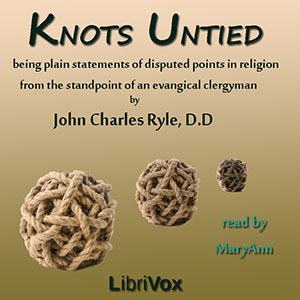
Being Plain Statements on Disputed Points in Religion, from the Standpoint of an Evangelical Churchman.The volume now in the reader's hands requires a few words of explanation. It contains nineteen papers on subjects which are matters of dispute among English Churchmen in the present day, systematically arranged. A moment's glance at the table of contents will show that there is hardly any point of theological controversy belonging to this era, which is not discussed, with more or less fulness, in these papers. The object of sending forth this volume is to meet the wants of those who may wish to see theological questions fully discussed and examined from an "Evangelical" standpoint, and complain that they cannot find a book that does this. To them I offer this volume, and respectfully invite their attention to its contents. It if does nothing else, I hope it may convince some readers that in the controversies of this day the reasonings and arguments are not all on one side.Whether the volume will do any good remains to be seen. At any rate it is an honest effort to untie some theological knots, and to supply some clear statements of truth from the standpoint of an Evangelical Churchman. That God may bless thie effort, and make it useful to the cause of Christ and the Church of England, is my earnest prayer. (from the Preface)
38 episodes
Written by a Church of England clergyman in the time of Cromwell, this work is praised for both its style and content. Taylor's work was much admired by John Wesley, the founder of Methodism, for its devotional quality; and by Samuel Taylor Coleridge, Thomas de Quincey, and Edmund Gosse for its literary qualities.Holy Dying is meant to instruct the reader in the "means and instruments" of preparing for a blessed death, written in a time when death was a constant companion to life and not to be encountered without being ready for it. It assumes illness and a death-bed, with recommended meditations and prayers for the sick, the family, and the clergyman attending to the dying one. (Summary by TriciaG, with help from Wikipedia)
37 episodes
Written in the late 1600s by John Bunyan, author of The Pilgrim's Progress, this treatise exhorts Christians to holy living. Bunyan takes as his text Psalm 93:5, 'Holiness becometh thine house, O Lord, forever,' and from it he presents true holiness as true beauty, calling his fellow believers out of the religious hypocrisy of his era to a genuine pursuit of God. Spiritually, this work is a little-known gem from a respected religious figure, and historically it is a unique look at the Christian church and family in the seventeenth century. Whatever your reason for coming to 'A Holy Life,' it is worth the read...or listen. - Summary by Jennifer Raimundo
16 episodes
This is a small volume of Evening Prayers. Thoughts to think on in the quiet before bedtime; ideas that edify the soul, calm the mind and prepare our bodies and spirits for sleep. Each is not long, but they are edifying and thought provoking. As the author says in the prefact "May He with whom is "the residue of the Spirit," "cause His Angel to fly swiftly" and touch us in the time of our Evening Oblation; and may all that is amiss in thought and word be lost in the fragrant incense-cloud which ascends from the Golden Altar before the Throne!" "And thou shalt make an ALTAR to burn INCENSE upon:
"And thou shalt put it ... before the MERCY-SEAT that is over the testimony, where I will meet with thee.
"And when Aaron lighteth the lamps at EVEN, he shall burn INCENSE upon it."—Exod. xxx. 1, 6, 8.- Summary by Phil chenevert and the author
31 episodes
Saint Jane Frances de Chantal (1572 – 1641) is a Roman Catholic Saint, who founded The Congregation of the Visitation after the death of her husband. St. Francis de Sales was her Spiritual Director and a close friend. After St. Francis de Sales died, St. Vincent de Paul became her spiritual director.
These letters, which date from a range of 1611-1641, were written to her saintly spiritual directors, her children and relatives, other nuns and religious, as well many others. (Summary by Maria Therese)
112 episodes
“We have become so accustomed to limit the wonderful love and the large promises of our God, that we cannot read the simplest and clearest statements of our Lord without the qualifying clauses by which we guard and expound them”. This is what Andrew Murray writes in the preface to this practical and scriptural volume on the practice of prayer. This book has been of tremendous help to generations of believers as they have sought a more effective prayer life. It opens with the words of the disciples, “Lord, teach us to pray”. And so opens the school of prayer to which believers are invited. - Summary by Christopher Smith
33 episodes

The Mystical City of God is a book written in the 17th-century by the Franciscan nun, Venerable Mary of Jesus of Ágreda.
According to María de Ágreda, the book was to a considerable extent dictated to her by the Blessed Virgin Mary and regarded the life of the Virgin Mary and the divine plan for creation and the salvation of souls. The work alternates between descriptions of the Trinity, the Virgin Mary's life, and the spiritual guidance she provides to the author, by whom her words were reproduced for the spiritual benefit and growth of the reader. The book describes at length the various virtues, and how the reader should live in order to see them reflected in their own life, with the Virgin Mary as their model for sanctity. The work has the Imprimatur of several Popes and Bishops and appeals primarily to those who believe in “private revelation” and the sanctity of Mary.
Volume 3 deals with the Life of Blessed Mother after her return from Egypt. "The Sacramental Mysteries of the life of the Mother of God from the return out of Egypt up to her divine Son's ascension into heaven." - Summary by Wikipedia and Introduction
58 episodes
This book is addressed to the sorrowful, ... to whom their own or others' pain is a daily burden, upon whose hearts it weighs with an intolerable anguish. I seek to speak to these ; not as a teacher, but as a fellow. Sharing their feeling, and knowing well how vain is the attempt to throw off misery, or to persuade ourselves that life is better than it is, I would fain share with them also some thoughts that have seemed to me capable of casting a bright gleam of light athwart the darkness, and, if they are true, of bringing an immense, an incredible joy out of the very bosom of distress. - Summary by James Hinton
9 episodes
The fourth and final volume of Lea's monumental work on the Spanish Inquisition. This volume discusses how the Inquisition dealt with mysticism, solicitation of illicit relationships, bigamy, theological propositions, witchcraft and sorcery, political activity, and almost every other facet of daily life. It concludes with an overarching history of the Inquisition and retrospective. (Summary by TriciaG)
100 episodes
The celebration of the Tercentenary of the Authorized Version of the English Bible of 1611 has called into existence the little book here presented to the reader's notice. It is the brief repetition of a story beginning in 670 A.D. and reaching on for twelve hundred years to 1879. It takes us back to the Monastery of Whitby where Caedmon the monk paraphrased Scripture story in Saxon song, and brings us through the centuries to the Abbey of Westminster where a distinguished body of English scholars met in 1870 and commenced that Revision of the Scriptures which first saw the light in 1881. (From the Preface)
8 episodes
Leo Tolstoy's "A Confession," written in 1882 shortly after a life-altering spiritual crisis, is a brutally sincere reflection on life, morality, and the nature of faith. Tolstoy describes in great detail the process by which he lost his faith in established Christian churches, the meaninglessness of wealth and fame, the agony of acute depression, and how he overcame misery and dread through personal study of the teachings of Jesus Christ. Along the way, he contrasts the artificial faith and arrogance of educated people with the genuine faith and humility of the Russian peasant. This work, and others of its ilk, were aggressively censored by the Tsarist regime and directly led to Tolstoy being excommunicated by the Russian Orthodox Church. Summary by Paul Rizik.
16 episodes
The idea, so common in the ancient writers, is not all a poetic conceit, that the soul of a man is only a fragment of a larger whole, and goes out in search of other souls in which it will find its true completion. We walk among worlds unrealized, until we have learned the secret of love. We know this, and in our sincerest moments admit this, even though we are seeking to fill up our lives with other ambitions and other hopes. In spite of the vulgar materialism of our day, we do feel that the spiritual side of life is the most important, and brings the only true joy. And friendship in its essence is spiritual. It is the free, spontaneous outflow of the heart, and is a gift from the great Giver. (Hugh Black)
9 episodes
The present volume contains a series of papers about "practical religion," and treats of the daily duties, dangers, experience, and privileges of all who profess and call themselves true Christians. (Summary from the preface)
30 episodes
First published in the early 17th century, it has proven its value as a daily spiritual guide and helpful reference for living an authentic Christian life. Written specifically for laymen, it began as letters from Saint Francis to a married woman who was seeking holiness amidst the distractions of her life of wealth and status. It contains treasures of wisdom for every reader, from eager beginner to lifelong Christian. Summary by Wikipedia and Phil Chenevert.
120 episodes

The Obscure Night of the Soul, better know today as The Dark Night of the Soul, is the distilled teaching of St John of the Cross, who reintroduced and revolutionized Christian Contemplation in the 16th Century. The text remains in print until this day, and has been an inspiration to seekers for centuries. St John's method is known as the Via Negativa, defined in Wikipedia as "a type of theological thinking that attempts to describe God, the Divine Good, by negation, to speak only in terms of what may not be said about the perfect goodness that is God...In brief, negative theology is an attempt to clarify religious experience and language about the Divine through discernment, gaining knowledge of what God is not (apophasis), rather than by describing what God is. The apophatic tradition is often, though not always, allied with the approach of mysticism, which focuses on a spontaneous or cultivated individual experience of the divine reality beyond the realm of ordinary perception, an experience often unmediated by the structures of traditional organized religion or by the conditioned role-playing and learned defensive behavior of the outer man." - Summary by Ed Humpal and Wikipedia
40 episodes
The City of God Against the Pagans (Latin: De ciuitate Dei contra paganos), often called The City of God, is a book of Christian philosophy written in Latin by Augustine of Hippo in the early 5th century AD. The book was in response to allegations that Christianity brought about the decline of Rome and is considered one of Augustine's most important works, standing alongside The Confessions, The Enchiridion, On Christian Doctrine and On the Trinity. As a work of one of the most influential Church Fathers, The City of God is a cornerstone of Western thought, expounding on many profound questions of theology, such as the suffering of the righteous, the existence of evil, the conflict between free will and divine omniscience, and the doctrine of original sin. - Summary by Wikipedia
97 episodes
This short, anonymous work is thought to have been written in the 1300s by a member of the lay-religious group called ‘The Friends of God.’ Its central teaching is that humans can become one with God by living a holy, selfless life in which our will is subsumed into God’s, of which Christ is the ultimate example. Martin Luther discovered, named, and published Theologia Germanica in 1516, declaring that, "Next to the Bible and St. Augustine, no book has ever come into my hands from which I have learnt more of God and Christ, and man and all things that are." (Summary by Pleonic)
12 episodes

The Mystical City of God is a book written in the 17th-century by the Franciscan nun, Venerable Mary of Jesus of Ágreda.
According to María de Ágreda, the book was to a considerable extent dictated to her by the Blessed Virgin Mary and regarded the life of the Virgin Mary and the divine plan for creation and the salvation of souls. The work alternates between descriptions of the Trinity, the Virgin Mary's life, and the spiritual guidance she provides to the author, by whom her words were reproduced for the spiritual benefit and growth of the reader. The book describes at length the various virtues, and how the reader should live in order to see them reflected in their own life, with the Virgin Mary as their model for sanctity. The work has the Imprimatur of several Popes and Bishops and appeals primarily to those who believe in “private revelation” and the sanctity of Mary.
Volume two deals with the Incarnation of our Lord. "The mysteries of the life of the holy Mother of God from the Incarnation of the Divine Word in her virginal womb to the return of the holy family from Egypt." - Summary by Wikipedia and the Introduction
59 episodes
A short series of Christian sermons covering a range of topics, with the common thread throughout being the relationship between what we do know, what we may know, and what we cannot yet know about our lives, our world, and our faith. - Summary by Devorah Allen
8 episodes
A series of essays exhorting us with wit and humor to retain our childlike sense of wonder and delight in the world that God has made. A delightful and practical collection that teaches us to find and value the joy of life and faith. - Summary by Devorah Allen
26 episodes
As one of the first two bishops of the Methodist church in America and one of the most well-known circuit riders during the spread of Methodism, Francis Asbury kept a journal of his travels and activities. His journal begins with his prayerful decision to come to America in 1771 and continues to December of 1815, a few months before his death. In the meantime, we travel with Rev. Asbury across the ocean, over mountains, through rivers, and up and down the whole length of the fledgling United States of America. - Summary by Devorah Allen
53 episodes

"The writer, Colonel Brengle, gives us not only of the fruit of an orderly and well-stored mind on the great subject before us, but— and this is the more important—he tells us of the actual work of the Holy Spirit in the lives of ordinary men and women. The Holy Spirit is our Helper. In the work of righteousness He is a Partner with us. In the life of faith and prayer He is our unwavering Prompter and Guide. In the submission of our wills to God and the chastening of our spirits He is the great Co-worker with us. In the bearing of burdens and the enduring of trial and sorrow He joins hands with us to lead us on. In the purifying of every power from the taint of sin He is our Sanctifier.
All this is practical. It has to do with to-day—with every bit of to-day. In fact, so far from the sphere of the Holy Spirit being limited to the pulpit or the platform, or to the inward experiences of the religious life, He is just as truly and properly concerned with the affairs of the shop and the street, the nursery and the kitchen, the chamber of suffering and the home of penury, as with preaching the Gospel or healing the sick." (Summary from the Preface.)
24 episodes
One favorite topic of his was the excellence of virginity, and so successful was he in persuading maidens to adopt the religious profession that many a mother refused to permit her daughters to listen to his words. The saint was forced to refute the charge that he was depopulating the empire, by quaintly appealing to the young men as to whether any of them experienced any difficulty in finding wives. He contends, and the experience of ages sustains his contention (De Virg., vii) that the population increases in direct proportion to the esteem in which virginity is held. ( Herbermann, Charles, ed. (1913).
St. Ambrose. Catholic Encyclopedia. New York: Robert Appleton Company.)
20 episodes
His admirable book "On Virginity", written about 370, was composed to strengthen in all who read it the desire for a life of perfect virtue. - Summary by Herbermann, Charles, ed. (1913).
4 episodes

William Booth, who co-founded The Salvation Army with his wife Catherine in 1865, wrote several books on the subject of holiness. Purity of Heart, which was first published in 1902, is one of the most concise of these books. Its chapters were originally open letters Booth wrote and circulated throughout The Salvation Army to be read aloud as a ten-week sermon series on the subject of purity of heart. In the first letter, Booth explains what he means by the phrase "purity of heart", and the subsequent sermons build on this theme. Each letter focuses on a different aspect of holiness, such as reasons that a pure heart is desirable, the way to become holy, and examples of people whose hearts have been purified. In accordance with their initial purpose, the letters have a structure that is typical of Salvationist preaching; many of the letters begin with a summary of the previous week's message, include frequent appeals to quoted hymn lyrics throughout, and conclude with an altar call. Although the letters together form what could be considered a Salvationist theology of holiness, this book is less a theological treatise than an impassioned call to holiness by a vibrant preacher who eagerly wishes to cast aside any obstacles his hearers may encounter in seeking it, whether those obstacles be misunderstandings, false beliefs, reasoned objections, or insufficient desire. - Summary by David Purdy
11 episodes
This is a collection of the parables of the new testament. - Summary by Lynda Marie Neilson
26 episodes
Samuel Logan Brengle was a commissioner in the Salvation Army. His books are known for the practicality, joyfulness and authenticity. His life was spent working with people on the streets, so his insights into the work of the Holy Spirit are relevant to everyday life. His holiness was that of the street, the kitchen, and everyday life. His stories are of men and women living their daily lives. This is the second book in his "Holiness" series, which focuses on the gifts of the Holy Spirit. In particular, we are encouraged to follow the example of Paul in rejoicing through suffering, and learning to serve God in all circumstances. (Summary by Beth Thomas)
28 episodes
Rev. James Dodds, D.D. was a noted religious writer, educated in Edinburgh, joining the Free Church, serving in Dunbar for most of his career. In this exposition, he writes primarily to a lay audience to make the fundamental beliefs of the Apostles' Creed more accessible. Although he does not delve into the history of the development of the Creed, he draws from a wide body of reading, especially that of Martin Luther. - Summary by Larry Wilson
28 episodes
St. Augustine wrote in his Retractions 2:23: "After I had written 'on the Good of Marriage,' it was expected that I should write on Holy Virginity; and I did not delay to do so: and that it is God's gift, and how great a gift, and with what humility to be guarded, so far as I was able I set forth in one volume. This book begins," etc. - Summary by St. Augustine
4 episodes

As religion is the great business, for which we are created, and on which our happiness depends; and as religion consists in an intercourse between ourselves and our Maker; and so has its foundation in God's nature and ours, and in the relation that God and we stand in to each other; therefore a true knowledge of both must be needful in order to true religion. But the knowledge of ourselves consists chiefly in right apprehensions concerning those two chief faculties of our nature, the Understanding and Will. Both are very important: yet the science of the latter must be confessed to be of greatest moment; inasmuch as all virtue and religion have their seat more immediately in the will, consisting more especially in right acts and habits of this faculty. And the grand question about the Freedom of the Will, is the main point that belongs to the science of the Will. Therefore I say, the importance of this subject greatly demands the attention of Christians, and especially of Divines. - Summary from the preface
41 episodes









